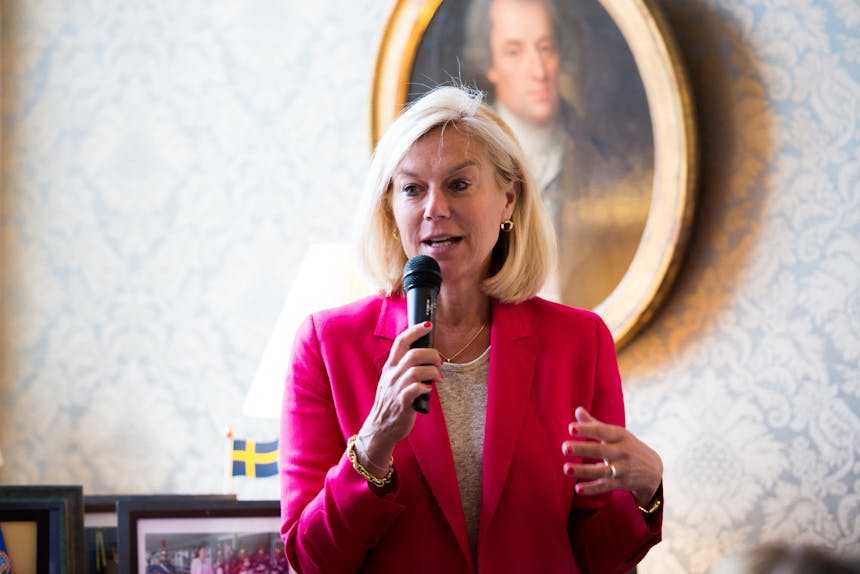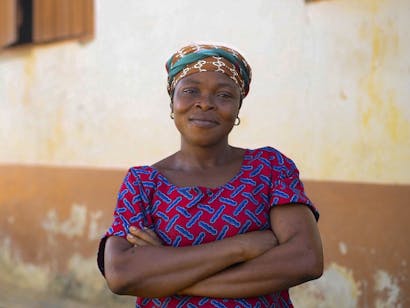Access to finance for female entrepreneurs
Kick-off event pushes agenda on access to finance for female entrepreneurs in emerging markets

Access to finance is one of the major barriers for female entrepreneurs in emerging markets. The female entrepreneurs we work with every day tell us, and so do the statistics. 1 billion women remain outside the formal financial system and 80 per cent of women-led micro, small and medium enterprises are either unserved or underserved.
This is equivalent to a $1.7 trillion financing gap. On Monday June 3rd, 2019, over 50 professionals and gender finance thought leaders gathered in The Hague for a kick-off event for the Global Entrepreneurship Summit 2019 (GES). The event focused on the way forward for access to finance for female entrepreneurs in emerging markets. Through round-table discussions, the group made seven recommendations to achieve progress for women entrepreneurs’ access to finance. The organizers plan to work on these recommendations in partnership with others in this ecosystem.
Sigrid Kaag, Dutch Minister for Foreign Trade and Development Cooperation, spoke at the event. “Financial institutions need to realize that investing in female entrepreneurs and financial inclusion for women is not only the right thing to do, but also the smart thing to do.”

This GES-side event was organized by CARE Nederland, Dutch Development Bank FMO, the Netherlands Enterprise Agency, the Netherlands Ministry of Foreign Affairs, Women’s World Banking, and the Embassy of Sweden in The Netherlands. It looked at the four key challenges that prevent female entrepreneurs from accessing, using and controlling affordable and appropriate financing in a way that it matches their ambitions and needs. Eleven female entrepreneurs from emerging markets shared firsthand experiences on the challenges they face in setting-up, running and scaling up their businesses. They also shared why they are supporting other women in their markets with growing their businesses through advocacy, incubation, acceleration, market research, empowerment and training.
Seven calls to actions were formulated to build a gender inclusive entrepreneurial ecosystem and partners plan to work on this agenda in partnership with a broad range of organisations varying from NGOs, financial institutions and women in business organisations and networks.
The traditional banking system has long bypassed female entrepreneurs. Especially those operating very small enterprises in informality and the missing middle are geographically, socially, and economically distant from financial institutions. Female entrepreneurs have ample potential to grow their businesses but face additional barriers at home, in their communities and the markets they operate in that are holding them back. The round-table discussions at the event focused the main challenges in reaching women entrepreneurs:
- How can we bring female entrepreneurs more within reach of appropriate and affordable financing?
- How can financial institutions better understand/address the profiles and financial and non-financial needs of different types of female entrepreneurs?
- How can we build a banking system that sees clients, is respectful and engaging and offers customer journeys that are tailored to their distinct wants and needs?
- How can we design financial products and services that consider women’s limited agency to make strategic decisions in their businesses, households and communities?
The event resulted in seven recommendations to push the agenda for achieving access to finance for female entrepreneurs in emerging markets.
1. Invest in entrepreneurship education and information for all, from an early age
Education and training in support of female entrepreneurs should start at an early age and continue throughout vocational training and with professional training later on. This is needed to make women more comfortable with business development and risk-taking, which is now seen as something only men can do. These trainings could include innovative techniques like gamification, storytelling and role-modelling.

Reintje van Haeringen, Chief Executive CARE Nederland: “Investing in women entrepreneurs is a triple opportunity: there is a business case for financial institutions; it improves the enterprises and lives of women; and the domino effect of equality will be felt in their communities and beyond.”
2. Invest in visibility: build the stories, facts and statistics for the business case
We need to overcome the misperception that investing in female entrepreneurs is not worth the risk. There is not yet enough gender-smart market data available to build local and global business cases, making it difficult for financial institutions to act upon market potential. We need to collectively develop our capacity and that of financial institutions to collect more and better sex-disaggregated financial data and to track our performance on truly impacting the lives and businesses of female entrepreneurs.
The business case for financing female entrepreneurs is long term and needs pre-investment, especially with respect to that large group of women operating very small enterprises in informality and in the missing middle. We need more and better data in order to develop effective business models for these groups.
Saskia Vossenberg, senior gender finance advisor at FMO
3. Invest in redressing harmful social norms that are holding women back
Next to legal barriers that restrict women’s economic opportunities, female entrepreneurs face unconscious social biases that limit their rights and decision-making power. By working together with both women and men at the community and business level, we need to raise more awareness about the economic contribution of women to the community and the constraints that they face in doing so.
4. Invest in bringing appropriate and affordable financial services to women entrepreneurs
Karen Miller, Vice President, Knowledge & Communications, Women’s World Banking: “By putting women at the center of product and solution design, we can ensure that women not only have access to the full suite of financial products they need but are using them to help reach their business and personal goals.”
Female entrepreneurs need more than credit to thrive in business and achieve security and prosperity. We need engagement in the customer journey, the full range of appropriate financial products and services (including microinsurance, savings and credit) that match women’s needs and are affordable for them.
5. Invest in financial sector accountability on diversity and inclusion
We need to hold the financial sector accountable for serving women-led micro, small, and medium enterprises. If policy makers enforce mandatory disclosure of diversity and inclusion data, the financing gap and the social and cultural norms holding women back become visible, and therefore easier to change.
Peter van Mierlo, CEO of FMO: “If it was mandatory to report on diversity and inclusion data – including the number of female entrepreneurs in financial institutions’ portfolios – we could develop targets, quotas, KPIs and make the gender gaps visible.”

6. Invest in distinguishing and scaling the change-making interventions
We have decades of experience with banking on women and empowering female entrepreneurs and supporting their business growth across the globe. We need more research, impact evaluation and sharing to showcase good practices. Once we can identify those change-making interventions with most potential for improving women’s financial inclusion and business support, we can prioritize the design, funding, and implementation of those interventions that are most likely to benefit female entrepreneurs in emerging markets.
7. Invest in cross-sector partnerships and collaboration
To speak louder, push harder for a gender inclusive eco-system, we need collective efforts, innovative partnerships, carry joint responsibilities, engagement and action of multiple stakeholders –including female entrepreneurs themselves, the men and boys in their homes, markets and communities as well as financial institutions, women’s organisations, NGOs, business networks, cultural and religious leaders and policy makers. There are a lot of separate initiatives popping up, and these need to be linked in order to be effective and to explore scale-up. We need capacity to build cross-sector partnerships, build bridges between stand-alone initiatives and to support women organisations both at grassroots and international levels.
There’s a shift happening within the global financial institutions sector and momentum has been building up to partner with local NGOs, women’s business networks for financing female entrepreneurs more and better. We need to do this now and do it together, because we all represent pieces of the puzzle.
Saskia Vossenberg, senior gender finance advisor at FMO
Narcisa Cruz Sosa, a ceramics artisan from Peru and one of the participants of CARE’s Women in Enterprise programme, travelled to the Netherlands to speak at this event. Read her story on Skillpower.


